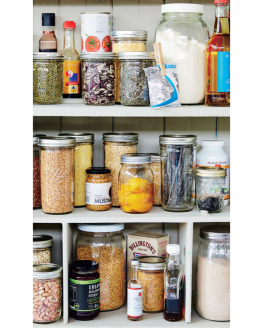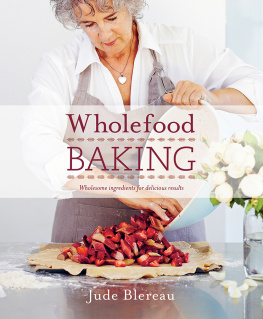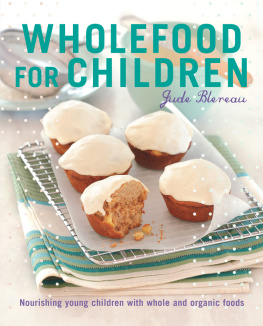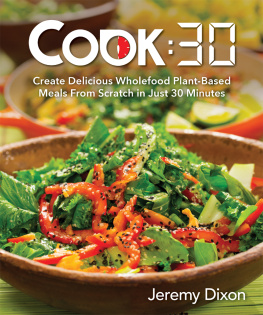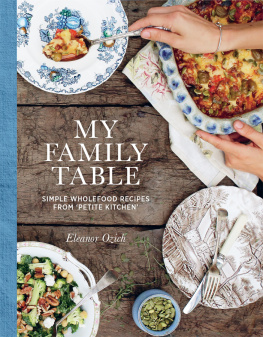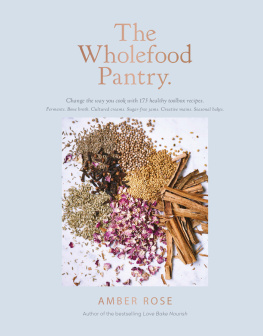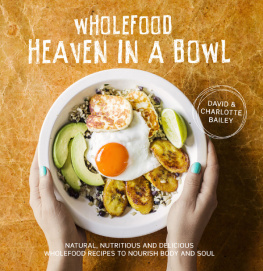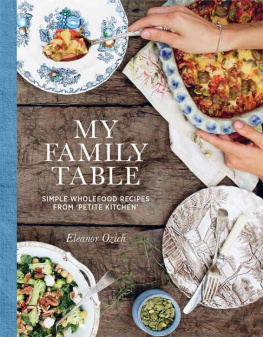Judes latest creation weaves her deep love of food and time-honoured cooking techniques with her profound depth of knowledge. this thorough, thoughtful and inspiring cookbook can be anyones beginning to whole, healthy, conscious eating. what a delicious place to start!
- Sarah Britton
best-selling author of My New Roots
This book is a welcome reminder of how good it feels to slow down, cook and nourish others and ourselves with whole and real food.
- Amy Chaplin
best-selling author of At Home in the Whole Food Kitchen
Jude Blereau was living a wholefood life long before wholefood was a buzzword for healthy living, and she knows better than most that one of the greatest obstacles to healthy eating is time, or lack of it. But with just a little preparation you can build a solid food foundation, so beingbusy doesnt have to mean going hungry
Wholefood from the ground up distills Judes wealth of knowledge into one incredible guide. In addition to more than 120 nourishing recipes there is clear information about what constitutes good food, where to source it and how to use it to its best effect. There is also a guide to building a wholefood pantry from scratch as well as practical tips for planning and preparing food ahead. Eat well, even on the busiest days.
AUTHOR, JUDE BLEREAU
Jude Blereau is a whole and natural foods expert who has been teaching and food coaching within the organic and wholefood industries for over 20 years. After co-founding the Earth Market in 1997, a wholefood store and cafe in Perth, Australia, she moved on to set up the Whole Food Cooking School in 2001. Her focus is on helping people learn about good food and giving them the tools and information they need to make healthy and wholesome eating a part of their everyday lives. Jude has written four books with Murdoch Books: Wholefood, Coming Home to Eat, Wholefood for Children and Wholefood Baking.
wholefoodcooking.com.au
Instagram: @judewholefood
Judes honest, practical tips and mouth-watering recipes ooze the kind of knowledge one only gets from truly living the wholefood life.
- Emma Galloway, author of My Darling Lemon Thyme
nourishing wisdoms
Long after weve achieved everything on our list, long after weve tried to do it all by skipping meals, grabbing the latest energy bar or eating the fastest 30-minute meal, we will still do best and indeed thrive with whole and real food. We will still yearn to slow down and come home to the smell of food cooking, and to sit with the people that matter to talk, share and eat.
Born in the 1950s to a mother of Italian descent, I was fortunate enough to grow up in a family and society that understood food; how to grow and source it, supply and prepare it so that it nourished both body and soul. We collected our eggs from the backyard, my younger sister Kate and I loved climbing the fig and almond tree to eat our fill when in season, and harvested simple vegetables from the back garden with a fair amount of wonder at the thrilling mystery of it all.
These foods were supplemented with seasonal fruits, vegetables, dairy, meats and grains that were produced in the hills that surrounded the city, or the farming lands a few hours drive away, with seafood from the ocean and nearby river. We also foraged for foods Kate and I knew that there was only a short time of the year we could collect the pine cones that fell to the ground at the local church, which we would take home and crack open to find the oh-so-delicious nuts, and adored going to my aunts house to play all day in the mulberry tree, eating ourselves silly. Families and friends also shared their crops. From these humble fresh and seasonal foods, Mum cooked simple but delicious food to feed and grow a large family.
Starting in the 1960s and 1970s this way of life began to noticeably change. With industrialisation, the work of growing and sourcing our food and then transforming that food into delicious meals to grow and nourish lost its value. Accompanying that loss was another: the vast body of food knowledge built up over generations. This knowledge how we think about food and then act upon that knowledge is what I call food culture. There is a societal food culture, and the personal food culture we hold within the home. With this loss, these nourishing wisdoms have largely disappeared indeed they are no longer considered central to our nourishment and well-being any longer. That bottle of pasteurised, homogenised low-fat milk might look like milk, have the word milk on the label, suit the bottom line of the company producing it and represent the current politically correct views on health, but no amount of spin can change the way your body is able to relate to and use that product it simply wont, because it simply cannot.
We call this inability of nature to interact with imitation foods by many names intolerance, allergy or disease. While I am a huge believer that each of us is a spiritual being having a human experience, here on earth our physical body is formed of and governed by the forces of nature, and this is something that has been well understood by all traditional cultures that enjoyed good health and happiness. Although it would be overly simplistic to dismiss the many benefits that industry, technology and society have delivered, it remains that we are asking the human body, which has changed very little over millennia, to suddenly adapt to very different and novel fuel sources and indeed, we are sicker and unhappier than ever before.
I started my wholefood journey some 23 years ago because I was (and remain) deeply interested in food and living a real and full life. When I first started along this path, I thought it was as simple as eating less or no meat and having wholegrain and wholemeal (whole-wheat) flours. I even went through a stage of considering dairy to be unhealthy. But these were the norms of the day. I now see the principles that make up wholesome and nourishing food quite differently from when I started out. I love being older, having seen a full lay of the land.
What is apparent now is how fortunate I was to have had the benefit of growing up with a strong, intact food culture. How blessed I was to have had such a deep connection with the actual growing of food and the subsequent preparation and transformation into tasty meals that nourished both body and soul. By collecting those eggs and harvesting food from the soil, trees or water I learnt where food came from, and the seasons and cycles of nature. I certainly knew that nothing tasted as good as the fruit straight from the tree, or the fish Kate and I caught with my dad and ate for breakfast. I absolutely understood that our nourishment depended on the sun, rain, wind and soil and, in doing so, was tethered to and a part of the great interconnected web of life. Yet, for many, without the benefit of that connection to the source of our nourishment and without a strong grasp of food culture, it is very easy to become confused about the many conflicting messages about what wholesome and healthy food is.

